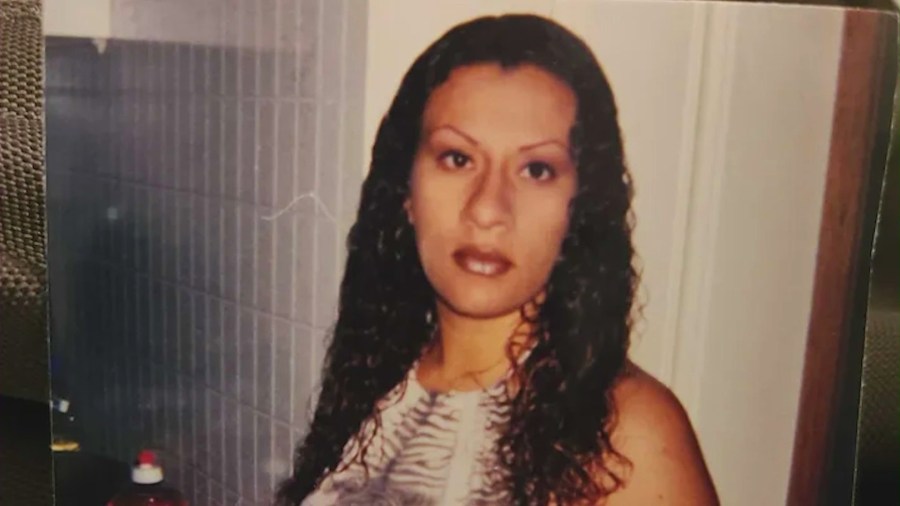Loved ones held a vigil Friday night to honor the life of a 46-year-old mother who was found dead at a homeless encampment in Los Angeles, as questions remain over her cause of death.
Held at the site where the body of Lucrecia Macias Barajas was found, friends and family shared their fondest memories of the U.S. Army veteran and mother of six children.
“She had her whole life ahead of her,” said Amely Becerra, the woman’s daughter. “She was still so young.”
Her daughters said Barajas left her home on the Saturday before Mother’s Day, and that was the last time they heard from her.
After Barajas was missing for several days and family members were unable to reach her, they eventually traced her cell phone signal to an encampment on Huntley Drive in the Westlake District near downtown L.A.
Inside a locked tent, they found the bodies of Barajs and her male friend, whose identity was not released. Neighbors said at least one of the bodies had been partially eaten by dogs.
Video of the scene showed Baraja’s youngest daughter wailing with grief, imploring police to take her mother’s body out of the tent.
Officers, however, waited because two live dogs, a pit bull mix and a shepherd mix, one of whom reportedly bit into Barajas’ body, were still in the tent.
Barajas’ daughter told the Los Angeles Times that her mother’s body wasn’t removed from the tent until early the next day, after animal services, who are now holding the dogs as evidence, responded to the scene.
Both Barajas’ and the male victim’s corpses were in the tent with the dogs for at least eight hours after they were found, her family said.
Barajas’ daughters said they’re unsure why their mother went to the encampment that day, but they believe the circumstances surrounding her death are suspicious.
Los Angeles police detectives are reportedly investigating the case as a suspected overdose, but her family believes homicide shouldn’t be ruled out and that there may be evidence of foul play.
One of their issues with the alleged “overdose investigation” is that the tent their mother and the other man were found in was secured with a lock on the outside of the entrance, presumably suggesting a third party could have bolted it as they left the scene.
In addition, a neighbor told The Times that he and his girlfriend were awakened at around 3:30 a.m. that morning to sounds of a man and woman arguing, followed by a woman’s screams for help before they heard silence.
“We have a lot of questions,” said Raul Claros, Founder/Director of California Rising. “First of what happened when she left the home — the timeline between when she left home and when she showed up [at the encampment].”
Born in Nicaragua, Barajas fled with her family in 1986 amid the country’s civil war. She later joined the U.S. Army between the late 1990s and early 2000s.
Her daughters told The Times that they believe their mother started using methamphetamine in 2017 as a way to manage raising six children, working full-time and battling stage 3 lymphoma. The children were reportedly unaware of their mother’s drug use, though they said she eventually got sober.
Barajas’ loved ones described her as a generous person who delivered food to those struggling on the streets.
“Lucrecia was a wonderful person and served our country,” said Stephanie Torres, a longtime friend. “She doesn’t deserve to be swept under the rug. No, we’re not going to let that happen.”
The homeless encampment where Barajas was found has remained a chronic issue for many residents, who say the area attracts criminal activity, drug use and safety hazards.
Neighbors said the area has been neglected by city officials and despite repeated complaints, nothing is being done to curb the growing problems.
“The family and the community believe that if these encampments were not here, these two individuals would still be alive,” Claros said.
Barajas’ daughters said they’ve spoken with LAPD detectives about the investigation and presented their theories on what they believe might have happened to their mother.
“That’s all I want, is justice, and that my mother’s memory won’t fade,” Becerra said.
L.A. city councilmember Eunisses Hernandez, who represents the Westlake District, told The Times in a statement that she has spoken with LAPD and is working to “ensure the family gets the answers they deserve.”
“I want people to know she wasn’t a homeless drug addict, because that’s not true,” Becerra said. “Some people are coming to that conclusion, and that’s not fair. She was just at the wrong place at the wrong time.”
The cause of death for Barajas and the unidentified man remains under investigation. A GoFundMe page to help her family with funeral expenses can be found here.










